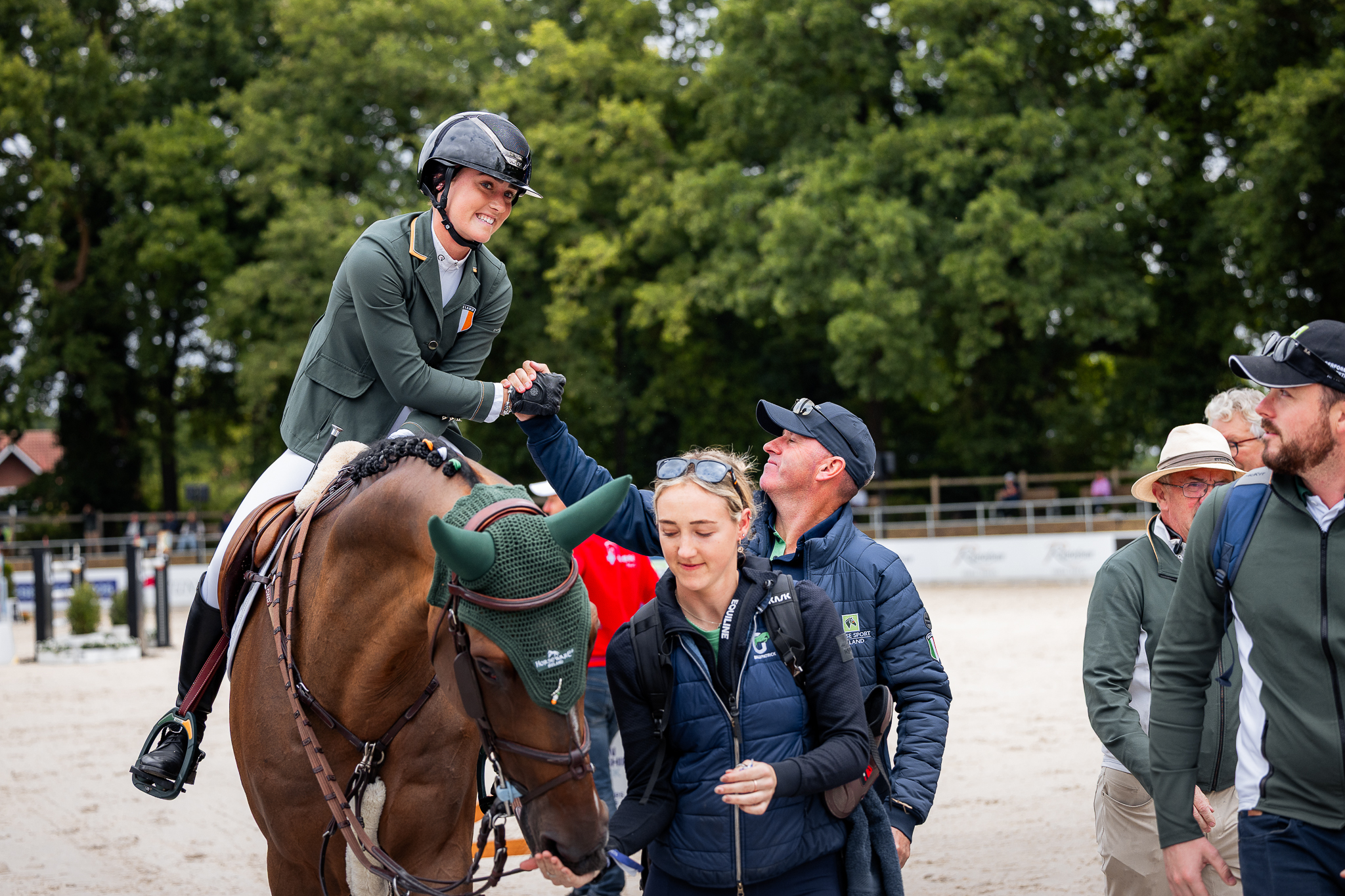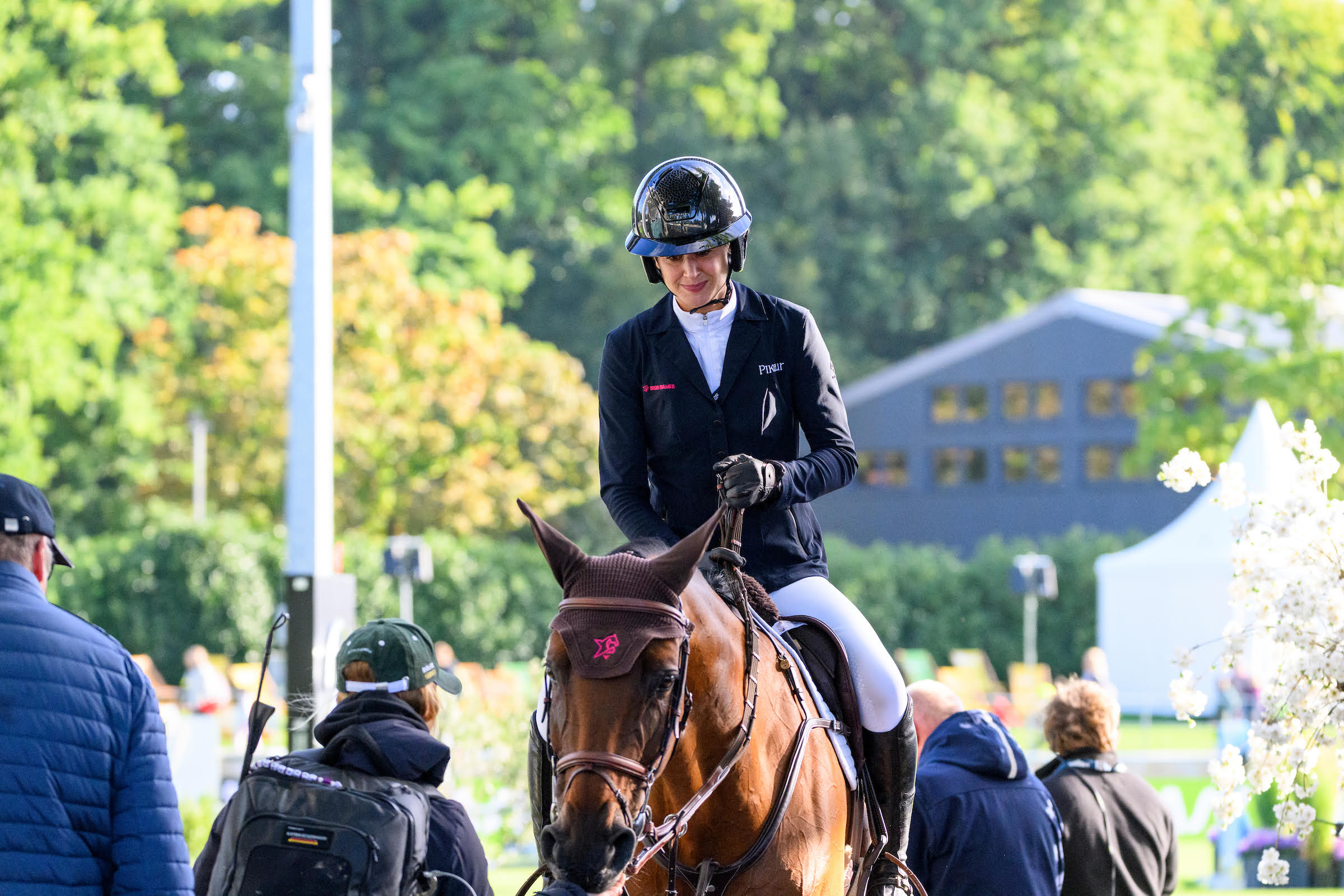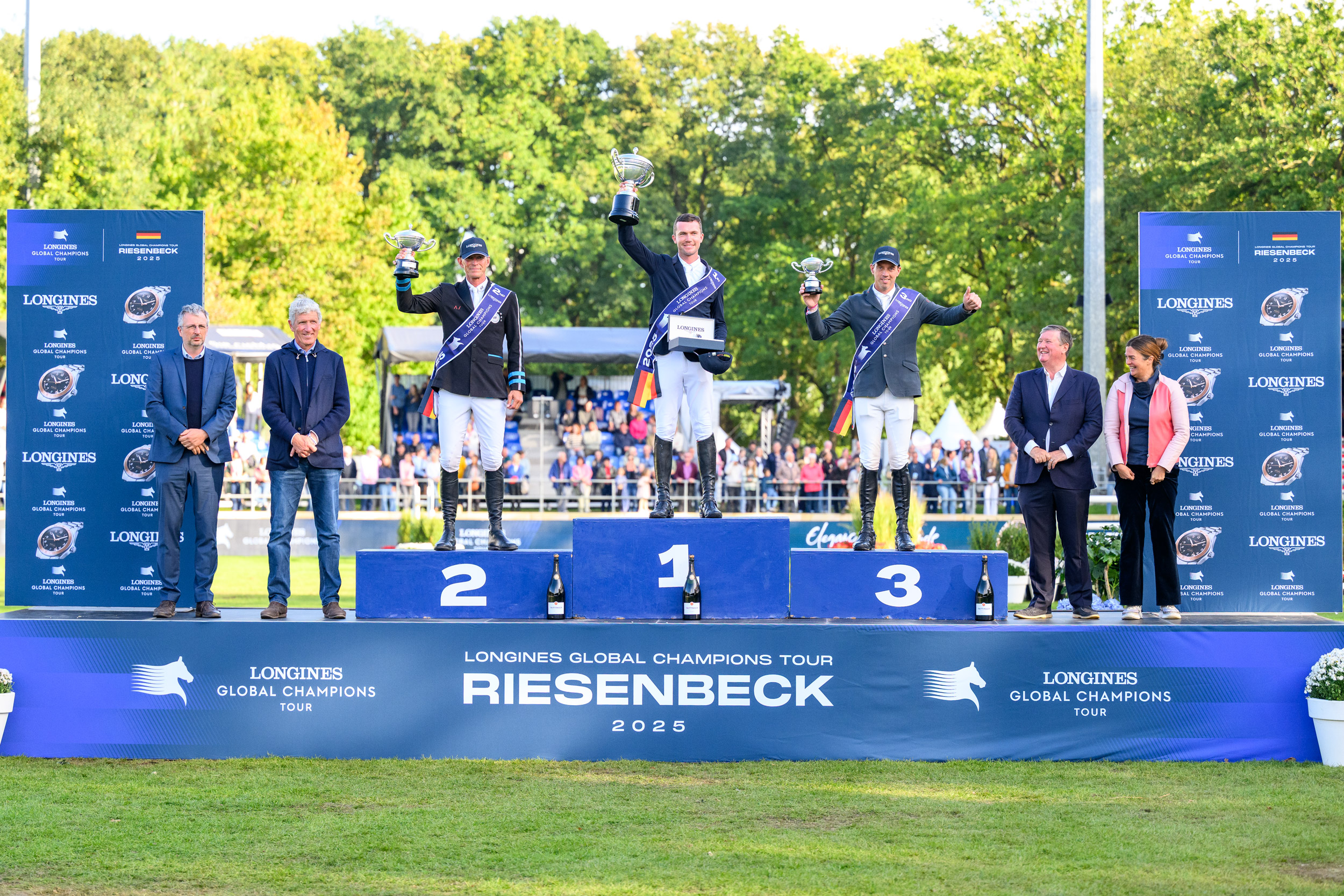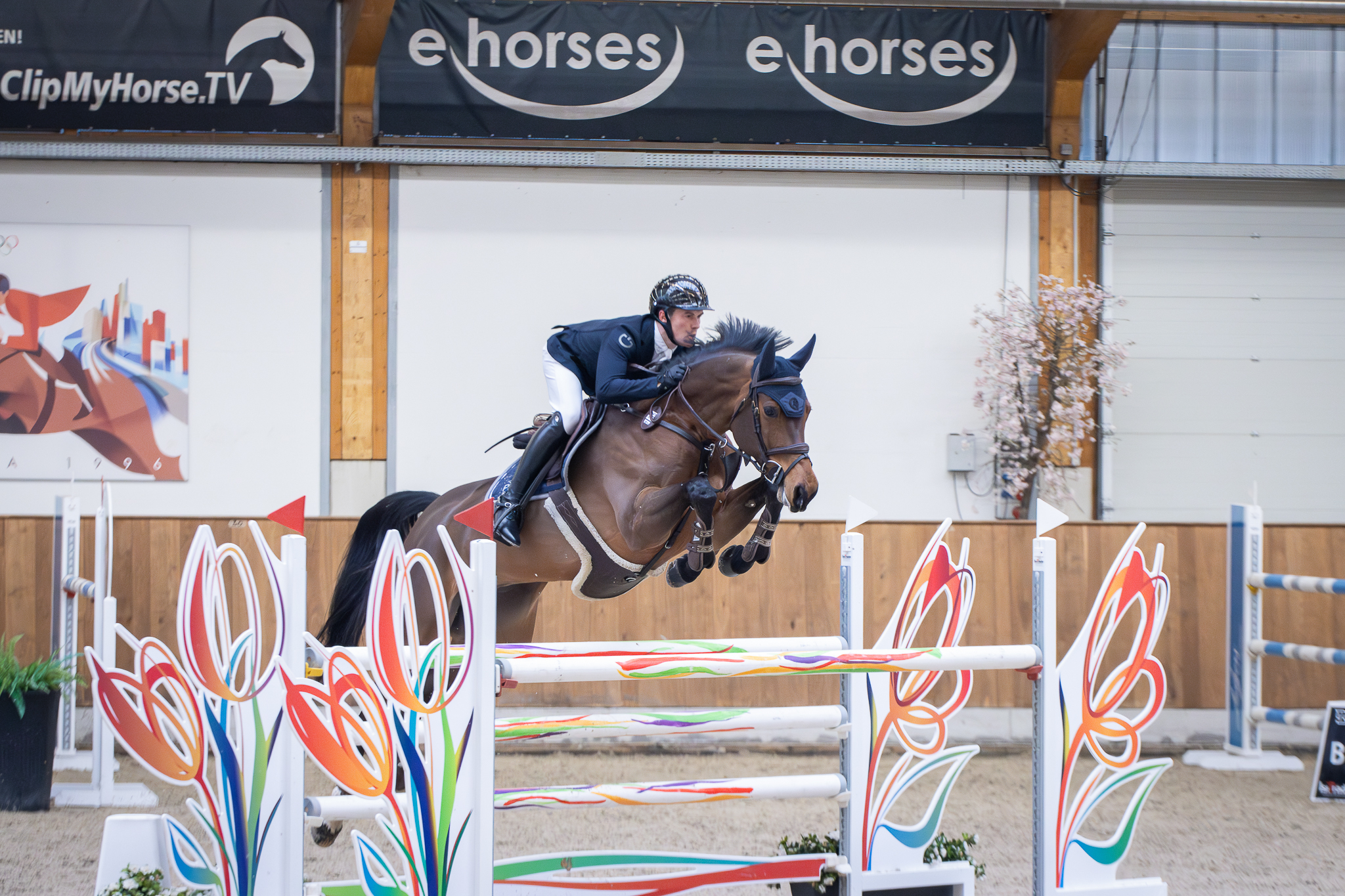Ireland has some of the best young jumping talent in the world and its young athletes consistently deliver at the highest level, securing multiple European Championship medals and Nations Cup victories in recent years. This year’s Europeans at Riesenbeck International have gone off to a great start for the riders from the emerald isle: Junior riders Alice Wachman, Tabitha Kyle, Emily Moloney and Paddy Reape secured the first team medal of the championship. But it’s not just the “luck of the Irish”. Horse Sport Ireland (HSI) has a strong system and team culture in place. “Nobody ever won being unlucky, but it certainly takes more than luck to be successful at this level,” Denis Flannelly says.
“We got many systems that work for us and we need to keep the other countries playing catch-up if we can,” Senior High-Performance Jumping Director Michael Blake says with a smile. Much of the long-term success of team Ireland can be attributed to his dedication. Blake took over the role at the end of 2019, succeeding Rodrigo Pessoa. He already had a longstanding association with Irish showjumping, having worked with both the youth and senior riders. Behind the scenes he operates tirelessly to create opportunities for his riders. The passion he has for the sport echoes in every word he says: “We want to see Ireland doing well and see our horse owners being proud. We are a small country of five million people, and I suppose we're definitely punching a little above our weight now.”
Beyond the “fishbowl”
There was a period of time when the Irish struggled to win a medal. Blake, among others saw that something had to change. One of the initiatives he came up with was a bursary system to send ten Irish riders to the United States and Europe every year. “There are a lot of good things in the American system that we can adopt,” he says. “Our riders learned a lot over there. They developed as people and as athletes. More so than if they would just stay at home in Ireland and ‘swim around the same fishbowl’. So we wanted to broaden their horizons.” That strategy worked out superbly, and with the likes of Michael Duffy, Michael Pender, Eoin McMahon and later Tom Wachman or Seamus Hughes Kennedy coming successfully through the system, the Irish pool of talented younger riders increased dramatically.
Tom Wachman recently praised Michael Blake in an interview: “He has been brilliant for Ireland. He has given a lot of young riders a chance, used a lot of different riders across different Nations Cups and he has been very successful with his strategy. For us younger riders, the nations cups provide a really good experience; they put you in those pressure situations like no other competition does. What has also been great to experience is that every Irish rider, regardless of if on the team or not, wants Ireland to win.”
Education and mentorship instead of Netflix
Michael Blake jokingly admits that he has a lot to learn, but enthusiasm sure isn't lacking. Close to his heart are education and mentorship. Every Irish young rider has an experienced senior rider to mentor them. “There are phenomenal riders in this world, you’ve got to learn from them, pick the best pieces and put them together. That’s what we try to do and encourage our guys to do the same instead of watching Netflix. We are regularly giving them a list of rounds that we think they should watch. And we want them to come back and tell us what they saw in that round, and we see, if it was the same thing that we saw. The riders need to constantly evolve and develop.” He emphasises that it's not just about riding, the athletes also need to learn how to run a business, how to attract, look after and keep a sponsor and how to talk to the media. At the beginning of the year he sits down with the riders and maps out a show plan for the year.
120 opportunities
At the heart of the plan are nations cups. No country is competing in more nations cups than the Irish. By February the High Performance team has planned ahead as far as Falsterbo in July and done a preliminary selection for each event. “We believe nothing prepares you better for a nations cup than a nations cup. We also want to give as many young riders as we can a chance. If we do 30 nations cups by four riders, that’s 120 opportunities,” Blake explains. This strategy is not about prize money, it's about creating experience and opportunities. Our riders just want to ride on the team, then they want to ride on a better team, and then again on a better team, it’s a progression,” he adds.
While most of his knowledge is in his head Blake keeps his own “little black book” that has every course, its strides and course designer noted over the years. This has become an invaluable tool for the team at every event. “I have kept every book since 2017,” Blake tells. “Because every course builder has a style and my job is to beat the course builder. So when we walk the course Denis and I will bounce ideas off each other. I’m very grateful to Horse Sport Ireland. They have given me this position and allowed me so much freedom and support over the years.”
Denis Flannelly appointed as Lead Consultant
Earlier this year HSI announced that Denis Flannelly and Liz Brennan would take the reins of its Youth Show Jumping High Performance Programme. Flannelly was appointed as Lead Consultant to prepare the team for the 2025 campaigns and beyond. A renowned Level 3 Jumping Coach, Denis Flannelly has played a pivotal role in the development of European Championship medal-winning riders. As Lead Consultant, Chef d’Équipe, and Jumping Manager, he oversees the technical and strategic direction of the programme and continues to drive its evolution. The establishment of a youth jumping selection panel forms part of his approach. The inclusion of top riders like Denis Lynch is a cornerstone of HSI’s long-term high performance pathway. As Youth Athlete Liaison, Liz Brennan is the primary contact for riders and their families, facilitating communication, mentorship, and support for young riders in the programme. Her vast extensive experience in team preparation and logistical planning is absolutely vital in ensuring the young athletes feel supported both in and out of the competition arena, while also making certain that their voice is reflected in programme decisions.
Land of the horse
Blake and Flannelly both point out, that when they say it takes a village, it's actually true of the Irish team. It’s not just the four riders who won Junior team gold at Riesenbeck on Thursday, there are 50 people or more who played a role in securing that medal. From the owner to the groom and the farrier, the physiotherapist and vet, every person in the chain did their job and rowed the boat in the same direction. Everyone loves what they do. It’s the kind of care and passion, that money can’t buy, it has to be in your blood and that’s where the Irish may have a key advantage — they are the self-proclaimed land of the horse. Horses have been part of the Irish culture for centuries. Denis Flannelly is therefore quick to acknowledge his colleagues, the selection panel, the team at HSI and even the riders, who didn’t make the selection for this year’s championship squad: “It’s all about the team, the horse the rider and the coach, and everyone who supports the horse’s wellbeing. Together we are all singing off the same hymn sheet. It’s my first year in charge of three youth teams and I couldn't be more proud of all the riders. And as much as we are result-driven, everything is all about education. To then win here is just the icing on the cake.”
Having come through the coaching programme in Ireland and then attending university to become a tutor for HSI, Denis Flannelly’s system has its roots firmly based on the horses’ correct way of going through the use of the German training scale. Horse and rider are encouraged to follow those principles when riding to a pole, cavaletti or a jump. Through this progression a combination is developed from polework to gymnastic training to riding distance work, and bringing that into the competition arena with them. “There’s a direct relationship between the way a horse works on the flat and the way they jump. When competing here at the championships they shouldn't ride any different than they should if they were riding a 1.20m class at their local show,” he points out. “It's all based on being able to go into the ring and deliver the numbers that we've walked. There’s no point walking the course if you don't try and ride those numbers, but you need to be adaptable and improvise to change the plan if necessary. This is all part of it.” Yesterday’s win was a prime example of Flannelly’s classical training system. Thinking outside the box sometimes, making high performance “normal”, that’s also part of the strategy. It leaves you with admiration for the Irish youth development. It's a pretty successful nursery.





